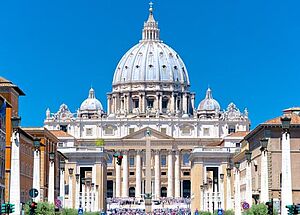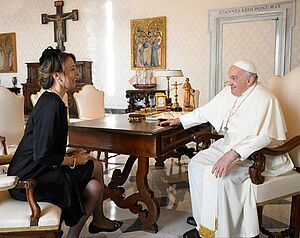Application for the theory of harmony to be included in the UNESCO list of intangible world cultural heritage
The procedure requires that such an application cannot be submitted directly, but must first be included in a country's cultural heritage list. In Switzerland, the responsible commission, headed by the Federal Office of Culture, meets every 5 years. The application was submitted on October 8th, 2021 and receipt was confirmed on October 21st, 2021.
Federal Councilor Viola Amherd, Head of the Federal Department of Defence, Civil Protection and Sport, has visited this page and, in her letter dated June 23, 2022, wishes every success for the Commission's pending decision.
According to a media release dated August 22, 2023, the application was not approved and the Christian symbolism and the ethical content of Western harmony were not included in the list. Science blog B 34: “The decision of the Federal Office of Culture” provides information on the background.
The answer from Rome

After the tasks of the Pontificio Consiglio della Cultura were assigned to another institution by Pope Francis in 2022, the decision now rests with the Dicastero per la Cultura e l'Educazione.
A suggestion was made that the Vatican State submit the corresponding application to UNESCO. The request was submitted on October 10, 2023 and was addressed to Cardinal José Tolentino Calaça de Mendonça, the Prefect of the Dicastero and also Grand Chancellor of the Pontifical Gregorian University and the Pontificio Istituto di Musica Sacra.

Cardinal José Tolentino Calaça de Mendonça

Swiss Ambassador in conversation with Pope Francis
The Swiss Ambassador to the Holy See, Mrs Manuela Leimgruber, was also included in the dialogue and invited the author to a personal conversation that yielded new insights:
Both inside and outside the Vatican, a gap is opening up between those who follow the material with professional interest and those who are skeptical even before reading it and expect recognition from a higher authority first and foremost. The professional support of two rectors of the Pontificio Istituto di Musica Sacra (Prof. Giacomo Baroffio and Monsignore Vincenzo de Gregorio) is not enough for this - strangely enough, because there is no institution in the world that is closer to the musical-theological cultural heritage of the West. For the second group, it is a matter of waiting until the Pope approves the musical symbolism as part of the Catholic world view, in accordance with the inscription that can be read in many places: MUSICA DONUM DEI. After that, there is no higher authority.
The situation is similar with UNESCO, as subordinates often do not have the courage to use their own reason when dealing with their superiors, as Immanuel Kant demanded, even though it would be enough to present to the decision-makers an object that at first glance does not seem to fully correspond to the prescribed scheme of the regulations. Christian sacred music maintains a living tradition.
The recommendation not to address specific conflicts such as the one in Gaza because they are a political matter does not correspond to the polydisciplinary approach of the present studies* and reveals political helplessness in the face of mathematical certainty, because if there were ever to be world peace, it would have to thank the acquisition of synergy skills for its achievement. Strategic thinking and action prove to be completely unsuitable means for this and only serve to benefit individual interest groups.
Whether humanity will ever be able to do this is another question - see Blog C8 “Minima Harmonia. Concrete Utopia” and Video XXX: “Disregard for Harmony describes the sore spot of humanity” or Video XXIX: “If Harmonia were female Pope...”.
The author would like to express his sincere thanks for the insightful conversation.
*****************
*A worldview that claims to be all-encompassing (ancient Greek: καθολικός katholikós) can only be processed and understood without any academic limitations, see Blog C1: “Polydisciplinary reflections on the symbolism of the Western tonal system. On the academic disregard for European cultural heritage”, In. Rivista Internazionale di Musica Sacra 36, 2015, pp. 49-79. Furthermore, it is a principle of harmony not to exclude differences but to integrate them synergistically.

